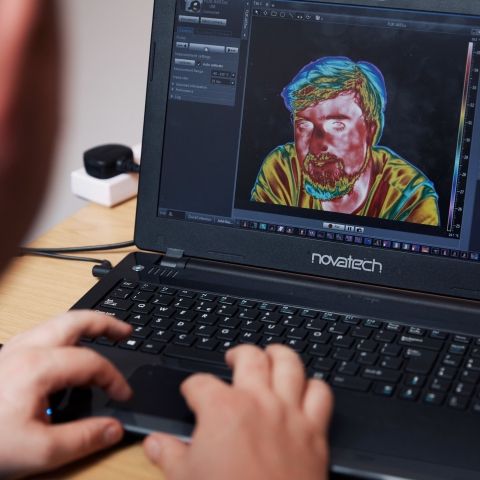

Postgraduate research in psychology
Ready to start your research career? Explore our postgraduate research degrees in psychology
Psychology at the University of Portsmouth is ranked 5th of the modern universities for research quality
Research Excellence Framework (REF) 2021
If you want to further your psychology knowledge through your own research, start your journey at Portsmouth.
Our Department of Psychology is home to internationally-renowned experts in psychology and exceptional facilities for practical and theoretical research – 100% of our research impact in the area of psychology, psychiatry and neuroscience was rated as outstanding or very considerable in terms of reach and significance in the most recent Research Excellence Framework (REF 2021).
Our fundamental and applied research reflects the broad scope of psychological study, exploring topics including child development of social skills, eye witness testimony, the evolution of primate facial expressions and factors affecting drug use.
Our researchers are addressing important issues in society, whether helping law enforcement agencies prosecute, developing methods to improve wellbeing and quality of life, supporting animal conservation and welfare initiatives, or unpacking the basics of psychological functioning – and as a postgraduate researcher, you'll play your part in transforming our expertise into action.
Research degrees
Find out about our PhD, MPhil, Professional Doctorate and PhD by Publication opportunities in Psychology below, including how to apply, entry requirements and funding your degree. For more detailed information about the application process, visit our How to Apply pages.
Psychology PhDs and MPhils
Explore our pre-approved funded and self-funded PhD projects in Psychology, or submit your own research idea.
PhD and MPhil projects
Funded
There are currently no funded PhD projects available in this area – for more information on funding your own research project, visit our pages on funding your research degree.
Self-funded projects
- Exploring the limits of adverse effects of misinformation
-
Improving eyewitness memory retrieval and recognition: from police investigations to the courtroom
- Scaffolding memory accuracy in ageing: The role of metacognition, strategies, and memory aids
- Understanding The Psychobiological Mechanisms That Influence Binge Drinking Behaviour
Submit your own idea
If you already have a research idea, find a supervisor whose research interests match yours by searching our Find a PhD Supervisor page. Once you've identified someone suitable, contact them to discuss your idea.
PhD by Publication
A PhD by publication is a postgraduate research degree based on research you've already undertaken and had published (excluding self-publishing) before registering with us.
Eligible research outputs include peer-reviewed academic papers, complete books or chapters in anthologies, and other materials accepted for publication, exhibited or performed. You'll have to submit these materials for examination between 6–12 months after registering with us.
For more information, please visit our PhD by Publication page.
Duration, fees and funding
What do my tuition fees cover?
If you're self-funding your PhD, you'll pay tuition fees to the University to cover course and university costs.
Your tuition fees cover:
- The cost of your postgraduate research programme* at the University as well as charges for registration, tuition, supervision, and examinations
- Bespoke training, professional development courses, networking, and research support through The Doctoral College
- Research seminars and workshops (university-wide and faculty-specific)
- A contribution to funding to attend a conference or development activity in your research field
- Tailor-made weekly and monthly events, including weekly, themed experienced researcher-led talks and workshops
- Helping you become part of our thriving research community, including Research and Innovation services where 77% of our research is world leading and internationally excellent in REF 2021
- Your graduation ceremony
- Viva examination and administration costs
- The facilities and equipment you need to complete your studies, such as computer rooms, access to laptops, the Library, and laboratories
- Access to resources including electronic journals, alternative guide to funding, and thousands of hours of educational videos on LinkedIn Learning
- University support services including academic, financial, careers and wellbeing support and personal tutors
- Membership of the Students' Union (giving you the right to vote in elections, join clubs and societies, and get free independent advice)
- Access to software such as Microsoft Office, SPSS and Adobe Creative Suite (this includes Photoshop, InDesign, and Adobe Premiere Pro)
*Please note that some research programmes may come with additional bench fees.
How long will my research degree take?
- MPhil: 2 years full-time, 4 years part-time
- PhD: 3 years full-time, 6 years part-time
- PhD by Publication: 1 year part-time
How much will my degree cost?
PhD and MPhil
UK, Channel Islands and Isle of Man students
- Full-time: £4,786 per year
- Part-time and part-time distance learning: £2,393 per year
EU students
(including Transition Scholarship)
- Full-time: £4,786 per year
- Part-time and part-time distance learning: £2,393 per year
International students
- Full-time students: £19,200 (may be subject to annual increase)
- Part-time and part-time distance learning: £9,600 (may be subject to annual increase)
PhD by Publication
External candidates: £4,786
Members of staff: £1,950
All fees are subject to annual increase. If you are an EU student starting a programme in 2024/25 please visit this page
PhD and MPhil
UK, Channel Islands and Isle of Man students
- Full-time and full-time distance learning: £5,006 per year (may be subject to annual increase)
- Part-time and part-time distance learning: £2,503 per year (may be subject to annual increase)
EU students
(including Transition Scholarship)
- Full-time and full-time distance learning: £5,006 per year (may be subject to annual increase)
- Part-time and part-time distance learning: £2,503 per year (may be subject to annual increase)
International students
- Full-time and full-time distance learning: £19,200 per year (may be subject to annual increase)
- Part-time and part-time distance learning: £9,600 per year (may be subject to annual increase)
PhD by Publication
External candidates: £5,006
Members of staff: £2,000
All fees are subject to annual increase. If you are an EU student starting a programme in 2025/26 please visit this page.
Bench fees
Some PhD projects may include additional fees – known as bench fees – for equipment and other consumables, and these will be added to your standard tuition fee. Speak to the supervisory team during your interview about any additional fees you may have to pay. Please note, bench fees are not eligible for discounts and are non-refundable.
Funding support
MPhil full-time and part-time courses are eligible for the Government Postgraduate Loan (UK/EU students only).
PhD full-time and part-time courses are eligible for the Government Doctoral Loan (UK/EU students only).
For information on other sources of funding, visit our funding your postgraduate research degree page.
Entry requirements
The entry requirements for a PhD, or MPhil include an upper second class honours degree or equivalent in a relevant subject, or a master’s degree in an appropriate subject. Equivalent professional experience and/or qualifications may be considered. All applicants are subject to interview.
If English is not your first language, you'll need English language proficiency at a minimum of IELTS band 6.5 with no component score below 6.0.
If you don't meet the English language requirements yet, you can achieve the level you need by successfully completing a pre-sessional English programme before you start your course.
Support and facilities
When you join us, you'll be supported by our Doctoral College, alongside your assigned supervisory team, who'll help you get the most from our facilities. The Doctoral College will help you become part of our thriving, collaborative research community, and help grow your skills as a researcher through the Graduate School Development Programme, which offers training, workshops and events.
You can use our specialised laboratories for conducting research, including spaces in which to study human movement, eye movement, psychophysiology, visual and auditory perception, primate behaviour, infant development, and autism. You can also access our virtual reality labs, mock police interview suite, digital analysis and video editing suite, photo booth and applied cognition lab.
By using our research facilities as a postgraduate research student, you'll experience many techniques used in contemporary psychological research and practice.
What can a postgraduate research degree do for my career?
Once you complete your postgraduate research degree, you'll be a highly-skilled researcher with the knowledge and skills to make an impact in many different industries.
Your postgraduate research qualification demonstrates to potential employers that you're an intelligent, capable and motivated person, with provable abilities and experience in critical thinking, problem-solving, project management, communication, leadership and creativity.
Apply
Apply for a research degree in Psychology by completing our online form.
February (2025 start)
April (2025 start)
October (2025 start)
Current research
Explore the work we're doing across the 4 areas of expertise in our Psychology research.
Centre for Comparative and Evolutionary Psychology
In the Centre for Comparative and Evolutionary Psychology, we're exploring evolutionary processes and comparing humans with other animals, to study the origins of behaviour.

Centre for interaction, development and diversity
In the Centre for Interaction, Development and Diversity, we study psychological phenomena in relation to the contexts and situations in which they emerge.

International Centre for Research in Forensic Psychology
The ICRFP has an established international reputation for conducting a broad range of criminological and forensic psychology research.

Quality of Life Health and Wellbeing Research Group
We explore life experiences. Our research includes empowering people with learning disabilities, exploring wellbeing, enhancing life in later years, and more. Read more.

